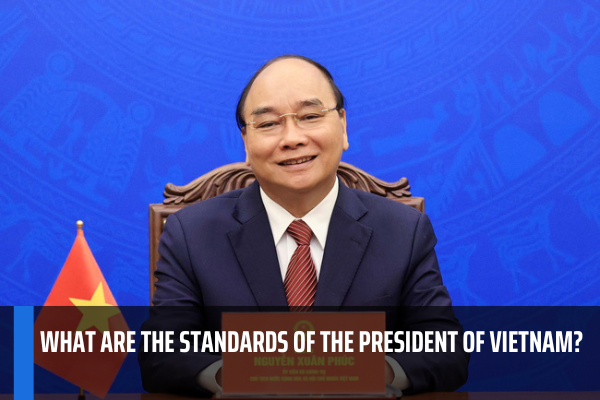President of Vietnam: What are the standards? What are the tasks and powers? How long is the term?
What are the standards of the President of Vietnam?
Pursuant to subsection 2.4, Section 2, Part I, Regulation 214-QD/TW in 2022 stipulates as follows:
"2. Specific title criteria
The criteria for the following titles must fully satisfy the general criteria mentioned in Section 1, Part I, of this Regulation; at the same time, meet the standards of each title, specifically as follows:
…
2.4. President
To fully ensure the common standards of members of the Politburo, the Secretariat, and at the same time, it is necessary to have the following qualities and capabilities: Having a high reputation, being the center of solidarity within the Central Committee, the Politburo, the entire Communist Party of Vietnam and the people. Having outstanding and comprehensive capacity in all aspects of work, especially in the fields of internal affairs, external relations, security and defense; In-depth knowledge of the legal profession. Being the center for uniting social forces and ethnic communities at home and abroad. To be fierce in leadership and administration according to assigned functions, tasks and powers. Having experienced and successfully completed tasks in the position of secretary of the provincial CPV Committee, city CPV committee or head of a Central Committee, ministry or branch; join the Politburo for a full term or more; special cases decided by the CPV Central Committee.”
Accordingly, in addition to ensuring the general standard, the foreign president will need to ensure the specific standards according to the above regulations.

President of Vietnam: What are the standards? What are the tasks and powers? How long is the term?
What are the powers of the President of Vietnam?
Pursuant to Article 88 of the 2013 Constitution stipulates as follows:
“Article 88
The President has the following tasks and powers:
1. To promulgate the Constitution, laws and ordinances; to request the Standing Committee of the National Assembly to reconsider its ordinances, within ten days of their passage; if those ordinances are still voted for by the Standing Committee of the National Assembly and disapproved by the President, the President shall refer the matter to the National Assembly for decision at its next session;
2. To propose to the National Assembly to elect, relieve from duty or remove from office the Vice President or Prime Minister; and, based on resolutions of the National Assembly, to appoint, relieve from duty or dismiss Deputy Prime Ministers, Ministers or other members of the Government;
3. To propose the National Assembly to elect, relieve from duty or remove from office the Chief Justice of the Supreme People's Court or Procurator General of the Supreme People's Procuracy; and, based on resolutions of the National Assembly, to appoint, relieve from duty or dismiss Judges of the Supreme People's Court; to appoint, relieve from duty or dismiss Deputy Chief Justices of the Supreme People's Court, Judges of other Courts or Deputy Procurators General or Procurators of the Supreme People's Procuracy; to decide on a special amnesty; or, based on resolutions of the National Assembly, to proclaim a general amnesty;
4. To decide on the award of orders, medals, state prizes or state honorary titles; to decide to permit naturalization in Vietnam, renunciation of Vietnamese citizenship, restoration of Vietnamese citizenship or deprivation of Vietnamese citizenship;
5. To assume command of the people’s armed forces and hold the office of Chairperson of the National Defense and Security Council; to decide on the award, promotion, demotion or deprivation of the ranks of general, naval rear admiral, naval vice admiral and naval admiral; to appoint, relieve from duty or dismiss the Chief of the General Staff or the Director of the Political General Department of the Vietnamese People’s Army; based on resolutions of the National Assembly or the Standing Committee of the National Assembly, to promulgate or annul decisions to declare a state of war; based on resolutions of the Standing Committee of the National Assembly, to issue an order on general mobilization or partial mobilization, to declare or cancel a state of emergency; or, in case the Standing Committee of the National Assembly cannot meet, to declare or cancel a state of emergency nationwide or in a particular locality;
6. To receive foreign ambassadors extraordinary and plenipotentiary; based on resolutions of the Standing Committee of the National Assembly, to appoint, relieve from duty; decide to send or recall ambassadors extraordinary and plenipotentiary of the Socialist Republic of Vietnam; to confer the ambassadorial title and rank; to decide on the negotiation and conclusion of treaties in the name of the State; to submit to the National Assembly for ratification of, or decision on the accession to, or withdrawal from, the treaties specified in Clause 14, Article 70; to decide on the ratification of, accession to, or withdrawal from, other treaties in the name of the State.”
Accordingly, the President will have the tasks and powers as prescribed above.
How long is the term of the President of Vietnam?
Pursuant to Article 87 of the 2013 Constitution stipulates as follows:
“Article 87
The President shall be elected by the National Assembly from among its deputies.
The President is responsible, and shall report on his or her work, to the National Assembly.
His or her term of office follows the term of the National Assembly. At the expiration of the term of the National Assembly, the President shall remain in office until a new President is elected by the succeeding National Assembly.
Accordingly, the term of the President of Vietnam will follow the term of the National Assembly. Thus, the President has a term of 5 years.
LawNet
